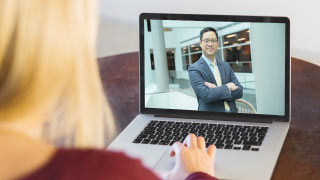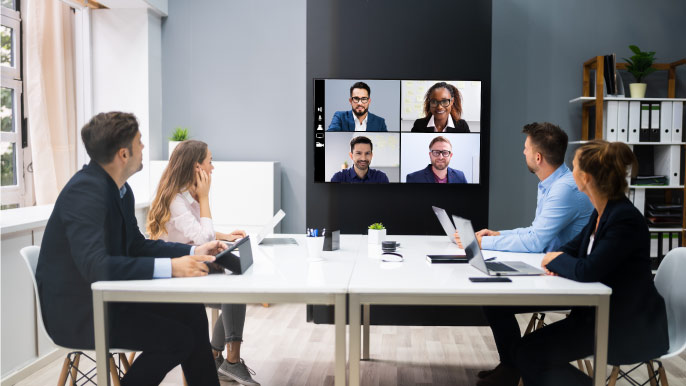Remote Depositions and Witness Coaching
March 23, 2023
Remote Proceedings
Remote Depositions and The Risks of Witness Coaching
The rise of remote depositions, while offering numerous advantages, also poses unique challenges. Remote proceedings have lawyers, deponents, and court reporters in physically different locations, which can limit observations of body language or communication between parties. These limitations raise concerns that a witness’s testimony can be influenced by other parties. It is not hard to imagine a situation in which defending counsel could provide advice or information to a deponent in real time during a remote deposition.
The Risks of Witness Coaching
A recent case involving a Boston lawyer illustrates how unethical behavior, such as communications between counsel and the witness, proves these concerns are warranted. The lawyer, while at the time wearing a mask, was accused of inappropriately whispering answers to their client during a deposition. In an order by Massachusetts U.S. District Judge Indira Talwani, she wrote,There can be little question that [The Lawyer’s] actions during [The Deponent’s] deposition constitute misconduct. In coaching [The Deponent] during her deposition, [The Lawyer] undermined the truth-seeking purpose of discovery. Furthermore, [The Lawyer’s] conduct has the effect of sowing seeds of doubt in the minds of litigators and judges as to the effectiveness of remote deposition proceedings, which have become an important tool of the court during the public health crisis.
While certainly rare, the case is not the only example of individuals attempting to take advantage of remote deposition proceedings by coaching witnesses off-camera.Repercussions for client coaching not only falls on the parties involved but also jeopardizes an otherwise strong case. Under Federal Rule of Civil Procedure 30(d)(3)(A):
At any time during a deposition, the deponent or a party may move to terminate or limit it on the ground that it is being conducted in bad faith or in a manner that unreasonably annoys, embarrasses, or oppresses the deponent or party. The motion may be filed in the court where the action is pending or the deposition is being taken. If the objecting deponent or party so demands, the deposition must be suspended for the time necessary to obtain an order.
If an order to terminate the deposition is granted then the party at fault may be required to pay the expenses acquired in making the motion, including attorney fees. Virtual proceedings adhere to the same rules as traditional depositions, so involved parties should follow the same rules as if in person.Establish Ground Rules Ahead of the Remote Deposition
Managing the risks of improper witness coaching starts before the deposition begins. Establishing ground rules with opposing counsel ahead of the deposition clears confusion and prevents future objections. A protocol for remote depositions addresses any concerns between those involved and should be finalized and available to all participating parties.A protocol example was drafted by U.S. Magistrate Judge Robert W. Lehrburger and is available on the U.S. District Court for the Southern District of New York’s website. Additionally, the American Bar Association released their own best practices for remote depositions that lays out six best practices when considering virtual depositions.
Below are some areas that your protocol agreement should cover:
Location and Visibility
Establish clear guidelines concerning participant locations for upcoming remote depositions. Ahead of the deposition, there should be confirmation on where the witness, counsel, and other participants will be located during the testimony. Deposing counsel should confirm the witnesses’ surroundings by asking where they are located and identifying any persons physically present in the room. Along with confirming physical locations, a remote deposition protocol should require all participants to be visible. Mandating all participants to be on camera and unmuted helps to mimic the experience of traditional depositions.Breakout Rooms
Make clear how breaks in the deposition are managed. Most video conference platforms offer virtual breakout rooms. Establish breakout logistics, including whether opposing counsel will consult with the witness remotely or in person during breaks. Breakout rooms should be controlled by the remote deposition service provider, with the agreement that conversations within breakout rooms are not to be recorded.Service Provider
To have a successful deposition, the first step is having all parties agree to a court reporting service provider that offers videoconferencing and remote deposition services. Technical issues, lack of security, and cumbersome controls can lead to delays or issues that can interrupt testimony. As the leader in remote depositions, Lexitas offers full support to attorneys and their teams to keep their discovery schedules moving forward. LegalView, our patented remote proceeding platform, provides a secure, easy-to-use, and completely interactive remote deposition experience for all participants, including the ability to mark and introduce exhibits electronically.Although remote depositions present possible risks for abuse, careful preparation helps ensure those participating can avoid any pitfalls while taking advantage of the numerous benefits virtual proceedings provide. With remote depositions looking to be a permanent fixture in the legal industry, those conducting and participating should invest time on the front end to avoid objections and issues during or after deposition testimony.
Please note: The information provided in this article does not, and is not intended to, constitute legal advice. All information and content are for general informational purposes only.
Related Resources

WhitePapers
Remote Proceedings
Efficient and Secure Remote Deposition Technology
The legal profession finds itself, like most other industries, undergoing major disruption. This guide looks at recent developments in legal technology.
Read More
Articles
Remote Proceedings
How to Achieve Dramatic Results with Remote Video Depositions
Now with advancements in remote video technology attorneys are increasingly opting to conduct remote depositions for several reasons.
Read More
WhitePapers
Remote Proceedings
How remote depositions can maximize value while minimizing expenses
Download this free whitepaper and see how remote depositions can maximize attorney value and minimize travel expenses.
Read More
